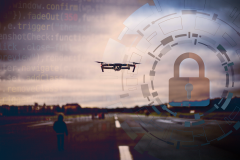
Developing and implementing applications for the validation of cyber-security in transport and remote or autonomous driving platforms
The aerial missions of the drones introduce risk elements in the air traffic, in the overflown territory and in the management of the data collected by the sensors. To guarantee the cyber security of drones, is essential to ensure the safety of flight operations and the surrounding air traffic, the safety of the areas flown over (infrastructures, urban areas, people), and to guarantee the availability, integrity and confidentiality of the data collected by the sensors during the mission and, therefore, the security of the interventions determined by the data themselves (think of the case of emergency management missions).
 For this purpose, in January 2019, the CRUISE project (Cyber secuRity in Uas mIssions by SatellitE link) was launched.
For this purpose, in January 2019, the CRUISE project (Cyber secuRity in Uas mIssions by SatellitE link) was launched.
The project, whose total cost is expected to be around € 2 million, aims to develop and implement technologies and applications for the validation of cyber-security in transport and remote or autonomous driving platforms, contributing to the creation, with the Grottaglie Airport Test Bed, a center of excellence for the testing and technological demonstration of Remotely Piloted Aircraft Systems (RPAS) of every class, drone operations in air traffic, advanced instruments for air traffic control (advanced ATM, UTM), and surveillance and inspection applications and services provided with drones.
The CRUISE project, funded by the European Space Agency (ESA) through the ARTES - IAP program (Advanced Research in Telecommunications Systems - Integrated Applications Promotion), will be carried out in collaboration by Planetek Italia (leader), Apulian Aerospace Technology District (DTA), Leonardo , Aeroporti di Puglia, ENAV, Telespazio.
The project is the first concrete step of the collaboration agreement between the DTA, the Italian Space Agency (ASI), the European Space Agency (ESA) and the Belgian Federal Science Policy Office (BELSPO), signed during the Global Space Economy Workshop - Space Cybersecurity for Mobility in May 2018. The agreement aims to develop knowledge and technologies for cyber security of space services for transport automation applications.
The Consortium, through the CRUISE project, intends to design, develop and validate a test range for the assessment of the vulnerability and resilience of Remotely Piloted Aircraft Systems (RPAS), or drones, to cyber-attacks. The "CyberSec Test Range" will allow evaluating the withstand to cyber-attacks both in synthetic environments (simulators) and by performing real test flights within the segregated air space connected with the Grottaglie airport. The CyberSec Test Range will integrate ICT infrastructures, Earth observation platforms, navigation (GNSS, Global Navigation Satellite Service) and satellite communications (SATCOM).
The tests will cover both “Visual Line Of Sight” (VLOS) and “beyond the radio line of sight” (BRLOS) flight operations, analyzing, in the second case, also vulnerabilities to attacks (jamming, spoofing, etc.) performed taking advantage of telecommunications and satellite navigation services (SATCOM, SATNAV). An extensive testing process will be performed on hardware attacks (access to the drone's driving systems), wireless attacks (exploitation of the command and control channel of the drone with the remote control station and of the communication channel of the data collected by the sensors), sensors (manipulation of the data received by the onboard sensors - eg GNSS receiver - or sent to the ground by the mission sensors). The CyberSec Test Range will offer services for all drone classes (from mini and micro to tactical drones and MALE) and for all types of operations (from VLOS to BRLOS).
The project will exploit and extend the capacities of the technological and airport infrastructure of Grottaglie - Grottaglie Airport Test Bed - in the field of experimentation and demonstration of drones and related innovative solutions for the integration of drones in uncontrolled air space. The Grottaglie Airport Test Bed is a program coordinated by the DTA, under development, which will implement an integrated system for the design and simulation of operations and air missions with drones equipped with appropriate sensors for monitoring the territory, for the emulation of the operations themselves and, finally, experimentation and demonstration with real flights in the segregated airspace.
The CyberSec Test Range will enrich the Grottaglie Airport Test Bed by developing the infrastructure components for performing cyber and IT attacks in synthetic environments, measuring the vulnerability and resilience of drones to attacks, and validating the security of operations and data collected during the mission.
The CyberSec Test Range includes the creation of a technological connection between the Grottaglie Airport Test Bed and the European Space Security and Education Center (Redu, Belgium), a center of excellence for ESA's space cyber-security services and with the Centro Spaziale del Fucino, managed by Telespazio, for the management of satellite communications in BRLOS flight operations using the Athena Fidus satellite.
The project includes the demonstration of the developed infrastructure and of the CyberSec Test Range. The demonstration will be attended by drone manufacturers, avionics and airborne sensor modules, drone operators, users of services provided through the application of drones, and researchers and developers of solutions for cyber-security. Furthermore, the ENAC (Ente Nazionale per l'Aviazione Civile, Italy) will benefit from the experience matured and from the knowledge of the effective capabilities of drones to resist cyber-attacks. This information will be used for the development of regulations, certifications and flight permits.
At the end of the project the CyberSec Test Range will be able to operate and provide testing services for solutions designed for cyber-security of drones.
Articles:
Project information
Client information:
European Space Agency (ESA)
Application fields:

